Jonah Lomu was the most exciting player ever - Jeremy Guscott
- Published
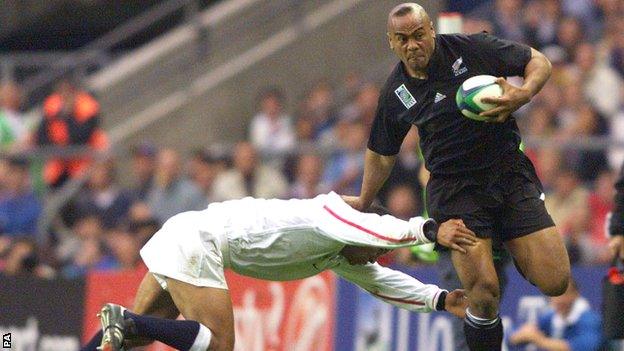
I was thinking ‘right this is my time - I’ve got you in my sights’
I'm stunned that Jonah Lomu has died. I was lucky to play both with him as well as against him, and was present for some of his most famous moments in an All Blacks shirt - England were on the receiving end, of course.
He was the ultimate game-changer and I remember laughing with his New Zealand captain Sean Fitzpatrick, saying it must be an easy team talk - "just get the ball to Jonah".
Facing Jonah was always exciting, although he was one of the players you wouldn't look at during the haka because he really went at it.
You always had excitement and nerves before facing the All Blacks but there were definitely more when Jonah was in the side, knowing at some stage you might have to tackle him.
I was part of England teams beaten by Lomu-inspired New Zealand sides in both the 1995 and 1999 World Cups, and while in the first one I was not directly in his firing line - I was watching on in shock some distance away - in the second I most definitely was.
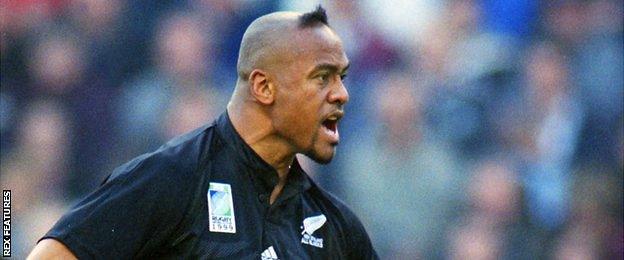
Guscott tried not to catch Lomu's eye during the All Blacks' pre-match haka
With the scores level at 16-16 in a pool game he scored a memorable try from halfway to give the All Blacks a lead they never relinquished, and I was the first man he beat on his run to the line.
I remember him getting the ball and I felt I could have a go because it was side-on rather than front-on.
He was in my channel and I could go to him rather than him come to me - if you were face-on there was nowhere to go, you just had to try to tackle him, and the chances are he would just run over the top of you.
Jonah Lomu, considered one of New Zealand's finest rugby union players of all time, has died at the age of 40.
In the 1995 World Cup semi-final, when he destroyed England with four tries, they ran him on a dummy line at me thankfully, but in 1999 I was thinking 'right, this is my time - I've got you in my sights'.
But his arm-span was from one touchline to the other - you could not get near him - and I was in a terrible position, as you can see from the picture I posted in tribute on Twitter,, external although the one at the top of this page doesn't look as bad.
I was never going to take him down from that terrible kind of position anyway, but when you face Jonah it doesn't matter even if you are zeroing in on his legs, because even if you manage to catch him and get inside that huge fend, you had to have a massive arm to get round his enormous legs anyway.
Inevitably, I ended up face down in the grass as Jonah powered on to score one of the many spectacular tries he seemed to reserve for England.
It was not impossible to tackle him - I remember my Bath and England team-mate Matt Perry bringing him down one time, albeit a bit like a stick in the spokes of a bicycle wheel - but you had to be so technically spot on to tackle him, otherwise you went the same way as Mike Catt and many, many others.
Lomu was unbelievable - Catt
There are big men on the wing in rugby these days - Julian Savea and George North spring to mind - but they can't match Jonah in his prime.
In addition to his huge power, Jonah had superb acceleration, fantastic balance and that beautiful style of running.
When he needed to smash people he lent into them and crumpled them, when he feinted he could lean in and then step past them and his out-and-out pace was the equal of South Africa flyer Bryan Habana in his prime.
I first became aware of him when I was watching the 1994 Hong Kong Sevens and saw this wonderful 18-year-old kid, he was unbelievable.
Going into the 1995 World Cup in South Africa he was still pretty much unknown though - just this up-and-coming kid, albeit one who was playing some fantastic rugby and lighting up the field.
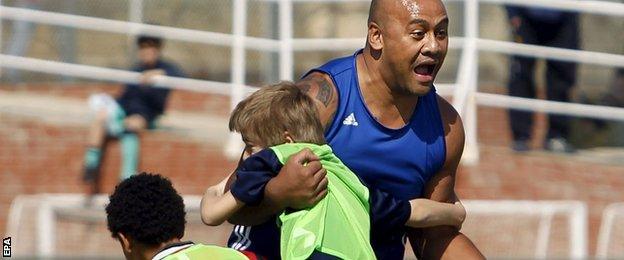
Beloved by fans of all ages, Lomu wasn't much older than a kid himself when he burst onto the world stage
Once the World Cup got going he immediately started terrorising defences and quickly become a phenomenon.
He was literally obliterating defences - outside, through the middle, over the top of players - there seemed no way to contain him and whatever strategy a team employed it was disintegrated by Jonah.
The one time he was nullified was by South Africa in the 1995 World Cup final. James Small and the rest of the Boks got in his face and closed him down, but on most occasions he came out on top.
Going into the 1995 semi-final against New Zealand we discussed how we had to get to him immediately, because once he'd taken three strides he would be up to top pace and would already have covered 10-15 metres, but he just blew our plans out of the water.
We knew what was coming but we just couldn't deal with it. We thought we could, but we couldn't.
It was a shock - when you're close to him you cannot believe how such a big man can run so quickly.
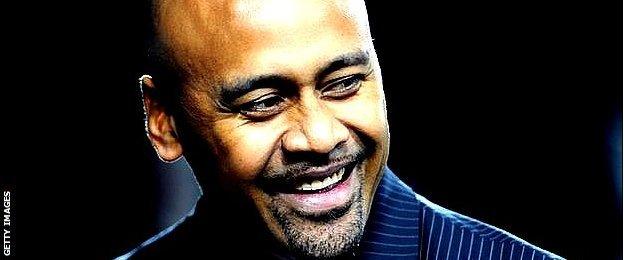
Off the pitch Lomu was known to be a gentle giant, always happy to make time for fans
In that game I made a break and when things closed down I passed to 6ft 5in, 18-stone England back rower 'Big Ben' Clarke.
Unfortunately for him he was near Lomu, and to this day whenever he sees me Ben still gives me grief, because he said when Jonah tackled him the lights went out.
Jonah was just a joy to watch. At the time, being on the receiving end wasn't the greatest thing ever - you go out to win after all - but when the match was over you could look back and appreciate it.
He was a giant of a man, someone who could play the game both brutally and beautifully, but off the pitch he was such a naturally nice guy, he had time for anybody and everybody and was such a gentleman.
My last ever game was playing for the Barbarians against England alongside Jonah, and as soon as I heard the news of his death I went and found my photo album to look up the picture of me, Jonah and Joeli Vidiri, a close friend of Jonah's as well as being a fine player himself.
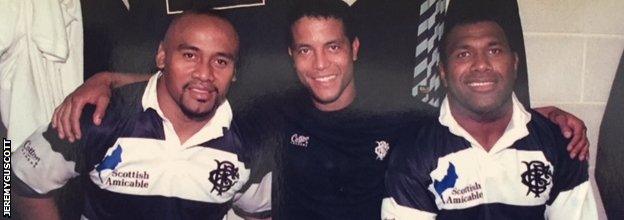
I just looked at the picture and it brought back wonderful memories. I'm happy I got the opportunity to play with him; that picture is very special and is a treasured memory.
Jonah inspired people because he was so watchable and so exciting at the time the game was beginning to grow - he transcended rugby because of his ability on the pitch and his conduct off it.
Jonah is the most exciting rugby player ever. He will always be remembered, never forgotten.
Jeremy Guscott was talking to BBC Sport's James Standley.
Listen again to BBC Radio 5 live's Jonah Lomu: The Man Who Changed Rugby
- Published18 November 2015
- Attribution
- Published18 November 2015
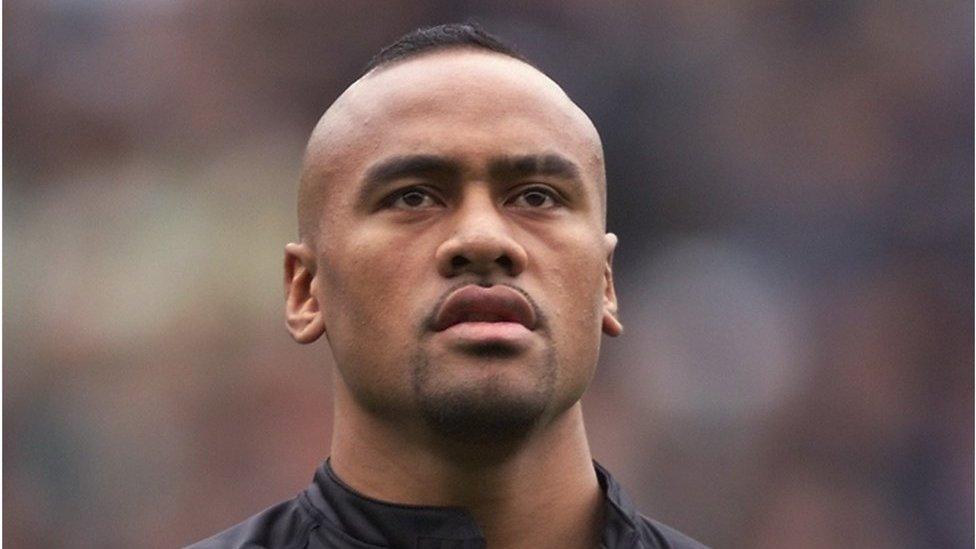
- Attribution
- Published18 November 2015
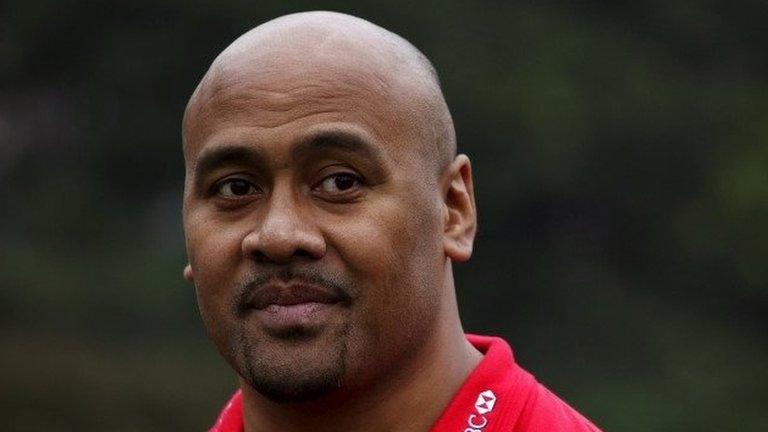
- Published18 November 2015
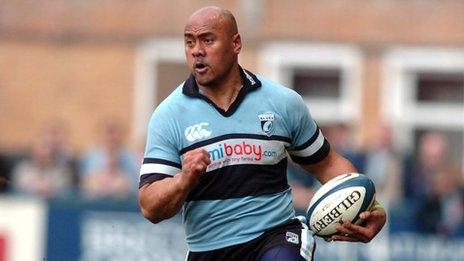
- Attribution
- Published16 September 2015
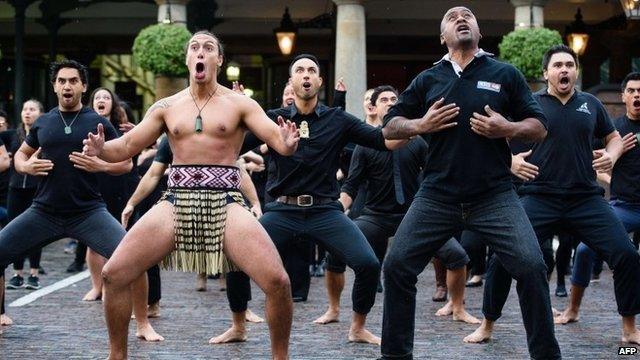
- Published18 November 2015
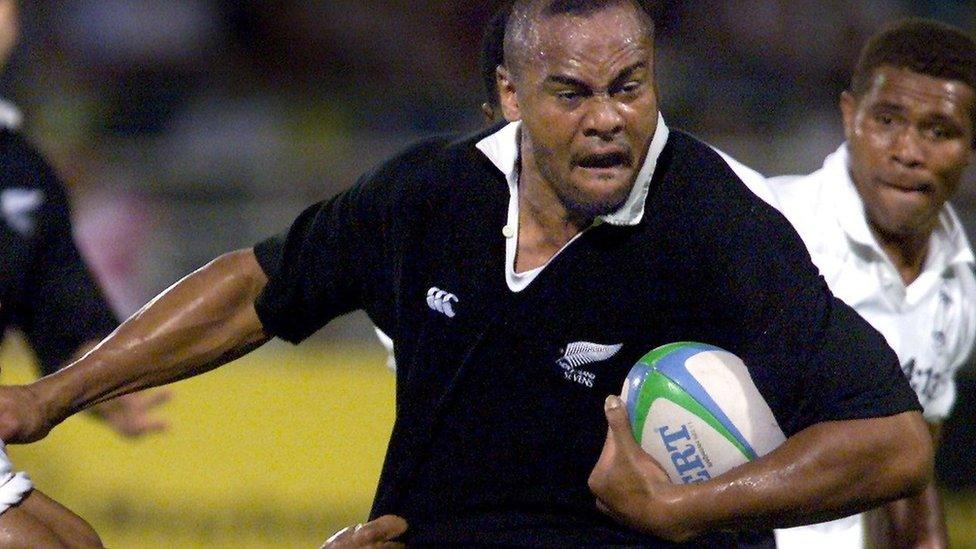
- Published3 February 2017
